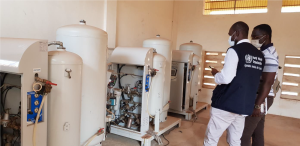In Benin, a new lease on life against COVID-19
Cotonou – Jonas, 43, a professional driver, was no stranger to long journeys and travel difficulties. But one particular trip in February 2022 will remain unforgettable.
"I was going on mission to Dassa, 200 km from Cotonou,” he recalls. “The trip went well but once I reached the destination, I began to feel very bad. I was suddenly extremely fatigued, and I began to sweat heavily.”
Over-the-counter remedies failed to alleviate his fatigue, fever, and headache. Worse, Jonah began to feel chest pains. "I felt a burning sensation; every breath was difficult and painful. It was like nothing I’d ever experienced.”
Jonas tested positive for COVID-19 and was admitted to Allada Zone Hospital, where a respiratory tract examination revealed that his lungs were already under attack from the coronavirus. He was immediately placed in intensive care and received oxygen therapy for five days. "That's what brought me tremendous physical and psychological relief,” he says.
Though indispensable to manage severe cases of COVID-19, the supply of medical oxygen remains a challenge for countries and for health facilities in Africa. In Benin, with the demand for medical oxygen rising due to the COVID-19 pandemic, World Health Organization (WHO) experts conducted an assessment mission in May 2021 to determine national oxygen needs and propose ways to increase the supply of oxygen and oxygen-related medical devices. The assessment found that of the six hospitals with medical oxygen production units, four were completely shut down: the Zonal Hospitals of Cové, Djidja, and Djougou, and the Parakou University Departmental Hospital Centre.
Additionally, the poor state of production plants led some hospitals to source oxygen from private suppliers, sometimes across borders, a situation resulting in enormous operating costs and severe disruptions to patient care.
With the health system coming under enormous pressure due to the pandemic, especially during the Delta-fuelled second wave in July 2021, Benin’s medical oxygen need increased exponentially, reaching about 500 cylinders of 7m3/day by the end of 2021 compared with the usual demand of about 280 cylinders of 7m3/day.
"We have financed the repair of oxygen production facilities in these areas, including replacing air blocks and thermostatic valves and repairing pneumatic connections,” says Dr Al Fattah Onifadé, Advisor for Essential Medicines and Pharmaceutical Policies at the WHO Office in Benin. “We have also trained five biomedical technicians to continue this work independently.”
For Laurent Houndeton, Director General of the Agency for Health Infrastructure, Equipment and Maintenance (AISEM) at the Ministry of Health, the support of WHO support is well timed.
"This support has allowed us to restore medical oxygen production in the four health facilities. Critically ill patients in need of oxygen have been able to receive adequate care," says Dr Tania Bissouma-Ledjou, Acting WHO Representative in Benin.
Financial support from WHO and other partners has also provided 4981m3 of medical oxygen for patients in respiratory distress, as well as the purchase of 420 empty reserve oxygen cylinders to maintain a medical oxygen supply in Benin. The support from WHO has been made possible by funding from the Government of Canada.
In the African region, WHO has responded to the oxygen supply crisis with technical and financial support. The Organization has supported the rehabilitation of 14 oxygen plants in nine countries and trained 245 biomedical engineers, technicians and clinicians in the maintenance of oxygen plants in six countries. In addition, it has supplied more than 14 000 oxygen cylinders to 12 countries and shipped over 1500 oxygen concentrators to 22 countries.
The Allada hospital where Jonas received care is among the facilities to benefit from this support.
“I spent a total of five days on oxygen, and the doctors assured me that the worst was over. There were a lot of doctors going and coming from my bedside. I want to recognize the dedicated people who cared for me day in and out.”
After 12 days in hospital, including five days in oxygen-assisted intensive care, Jonas was finally able to return home, where tears of sadness and fear gave way to tears of joy.
“People say there’s no coming back from Allada, but I came back!” he enthuses. “I’m grateful for a new lease on life. Without this oxygen supply, I would surely never have returned to my family. It really was a matter of life and death.”
Chargée de Communication
OMS Bénin
Email: akomatsria [at] who.int (akomatsria[at]who[dot]int)
Communications Officer
WHO Regional Office for Africa
Email: dialloka [at] who.int (dialloka[at]who[dot]int)
